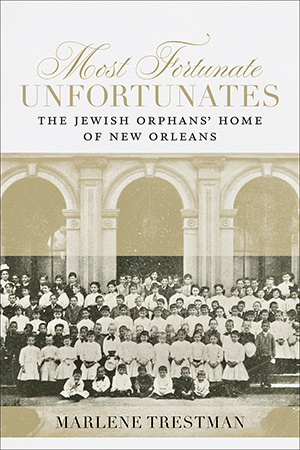
360 pages / 6.00 x 9.00 inches / 37 halftones
History / United States - 19th Century | History / United States - 20th Century | History / United States - Southern History
Marlene Trestman’s Most Fortunate Unfortunates is the first comprehensive history of the Jewish Orphans’ Home of New Orleans. Founded in 1855 in the aftermath of a yellow fever epidemic, the Home was the first purpose-built Jewish orphanage in the nation. It reflected the city’s affinity for religiously operated orphanages and the growing prosperity of its Jewish community. In 1904, the orphanage opened the Isidore Newman School, a coed, nonsectarian school that also admitted children, regardless of religion, whose parents paid tuition. By the time the Jewish Orphans’ Home closed in 1946, it had sheltered more than sixteen hundred parentless children and two dozen widows from New Orleans and other areas of Louisiana and the mid-South.
Based on deep archival research and numerous interviews of alumni and their descendants, Most Fortunate Unfortunates provides a view of life in the Jewish Orphans’ Home for the children and women who lived there. The study also traces the forces that impelled the Home’s founders and leaders—both the heralded men and otherwise overlooked women—to create and maintain the institution that Jews considered the “pride of every Southern Israelite.” While Trestman celebrates the Home’s many triumphs, she also delves deeply into its failures.
Most Fortunate Unfortunates is sure to be of widespread interest to readers interested in southern Jewish history, gender and race relations, and the evolution of social work and dependent childcare.
Marlene Trestman grew up in New Orleans as a client of the Jewish Children’s Regional Service, the successor to the Jewish Orphans’ Home. A former special assistant to Maryland’s attorney general, Trestman is the author of Fair Labor Lawyer: The Remarkable Life of New Deal Attorney and Supreme Court Advocate Bessie Margolin.
“Attentive to race and gender, and contextualized within general and Jewish history as well as the history of childcare, Most Fortunate Unfortunates sets a new standard as a well-researched, well-written, warts-and-all history of the Jewish Orphans’ Home of New Orleans.”—Jonathan D. Sarna, Braun Professor of American Jewish History at Brandeis University and author of American Judaism: A History
“What’s remarkable about Marlene Trestman’s Most Fortunate Unfortunates is its ability to shift scope, from the intricate details of a New Orleans institutional history—complete with names, faces, personalities, and incidents hitherto forgotten—to regional, national, and even international contexts.”—Richard Campanella, author of Cityscapes of New Orleans
“With narrative empathy and scholarly rigor, Trestman gives readers insight not only into one specific orphanage, but also into the larger challenges, triumphs, and dilemmas of an American Jewish community determined to care for its children.”—Kim van Alkemade, New York Times–bestselling author of Orphan #8: A Novel
“Most Fortunate Unfortunates belongs on the reading list of everyone interested in childcare and education, as well as southern and American Jewish and general history.”—Mark K. Bauman, founding editor of Southern Jewish History and author of A New Vision of Southern Jewish History: Studies in Institution Building, Leadership, Interaction, and Mobility
“A comprehensive and engaging study of a pioneering Jewish orphanage in the United States.”—Reena Sigman Friedman, author of These Are Our Children: Jewish Orphanages in the United States, 1880–1925
“More than 140 interviews and oral histories augment this enlightening institutional history that follows the emergence of professional social workers and explores still-evolving childcare standards.”—Hollace Ava Weiner, coeditor of Lone Stars of David: The Jews of Texas and author of Jewish Stars in Texas: Rabbis and Their Work
“Trestman’s Most Fortunate Unfortunates provides a wide-scoped, well-written, carefully documented, and extensively researched window into the story of Jewish institutional childcare in America over nearly a hundred years.”—Peter M. Wolf, author of The Sugar King: Leon Godchaux: A New Orleans Legend, His Creole Slave, and His Jewish Roots
“Marlene Trestman has written an outstanding study of the Home for Jewish Widows and Orphans, located in New Orleans. Aptly entitled The Most Fortunate Unfortunates, this book successfully navigates the perils of tedious institutional history and, on the other hand, unfettered personal accounts. What emerges is a readable history that adds to our understanding of Jewish practices and philanthropy, the city of New Orleans, and changing views on institutional child care. Additionally, given her exhaustive research into the "Home," Trestman gives readers a sense of what it was like to be one of those ‘fortunate unfortunates.’”—Jean Baker, co-editor of The Civil War in Maryland Reconsidered
Found an Error? Tell us about it.